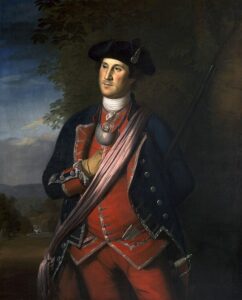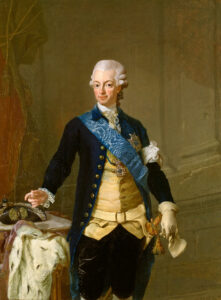Americanism Redux
August 19, 250 years ago today
A dress hangs painfully on her arms and back. It’s hard to get comfortable with the fabric rubbing against the scars and bruises. 70-year old Margaret remembers the latest beating. Her second husband, named Savage, hit her with a leather strap. He does it a lot. For today, 250 years ago, she heals. And she’ll use today in seeking another man’s help, someone who used to be her neighbor, sort of, back in Tidewater Virginia, along the Potomac River.
Though living in Ireland, Margaret has gotten help from him before through trans-Atlantic communication of letter-by-ships-driven-by-current-and-wind. Money, guidance, a kind word, for all of them and much more she is, in her words, “tendering all in my power to bestow, the tribute of an honest and grateful heart.”
Today is the latest time for more help. Margaret is snared in the wires of wills, estates, hearings, pleadings, affidavits, and legal court trappings as she seeks Virginia land left to her by her first husband, a better man than the current brute. It’s mine, she insists, from before he died, before I married this monster, before coming back to the British Isles from Chesapeake Bay in those worst days of turmoil between the British colonies and England. The mid-’60s were chaotic years for all of us.
She’ll send this new letter across the Atlantic Ocean to Mount Vernon where only weeks before an artist had painted a portrait of her best hope, clad in uniform, the garb of a colonel in the Virginia army and one-time veteran of the French and Indian War that ended nine years ago back in ’63.
George Washington, the man in the painting, has been a friend to Margaret Savage over the past five years. He knew her when her married name was Green and a future hid the Savage monster. Margaret pins everything on the ability of Washington, thirty years her junior, to influence her case and secure her status as heir to Virginia land and an enslaved black family with several children and their mother, Sarah. She’ll sell the land, she’ll sell Sarah, she’ll sell the children. Get the cash. That’s Margaret’s wish.
Washington has a lot of people who look to him for help. He’s a mainstay of the British colony of Virginia. In politics he had either served or keeps close track of local affairs in Williamsburg. He attends legislative sessions as a self-interested representative of Fairfax County, often more observer than participant. British imperial policies had upset him when, in the mid-’60s, they touched his pocketbook or curtailed colonial powers and liberties in Virginia. His business interests boggle the mind—as vast as his dependence on enslaved black men, women, and children for labor, some of whom have marks like Margaret’s. Washington used enslaved labor in farming, production, land improvement, construction, transportation, housekeeping, and much more. Washington manages shipping, credit, and market prices. Together with his wife, Martha, who brought immense wealth to the marriage, the Washingtons’ enterprises spread along the Potomac and across other river valleys. George and Martha are magnets for social activity in the Tidewater region, having hosted more than 1,000 people at parties, celebrations, and holidays the past few years. The guest lists include people from Europe and America alike.
Washington is a man who sees his role as helping people who know him and whom he knows. To him it’s a duty and obligation, self-described and self-conducted. He expects it of himself. 250 years ago today, Margaret certainly trusts him to meet his, and her, expectations. She is relying on him.
Also
250 years ago today, the same day that battered Margaret Savage sees the face of George Washington in her mind and writes his name on paper, another man grabs kingly powers. He is Gustav III. He declares the start of a new government in Sweden, immediately west of Russia, a kingdom of his first cousin, Catherine the Great.
Within hours, Gustav III announces a Swedish Constitution. The name “Constitution” is deceiving because Gustav today completes a coup d’état, a military takeover of the nation’s government by armed force led, naturally, by him and his most loyal followers. Few resisted or fought back, none in any meaningfully organized way. Today will be the day when the “Swedish Revolution” begins.
Gustav shouts to a group of 200 supporters in Stockholm palace today: “I will risk my life and blood for you and the salvation of the fatherland!” He seizes power and authority for himself as monarch while allowing the aristocracy to hold a set of responsibilities, modest by comparison, for itself. He writes a new oath of allegiance, requires the people nearest him in the palace to sign it, and orders the arrest of his opponents. He wants no more coherent political groups or parties or factions, no more Hats and Caps as they’d been called. He is Uniter.
Busy day of coup-making.
You Now
Power wielded for and against. Gustav III on a large scale, a nation of hundreds upon hundreds of miles falling in line. Washington on a big enough canvas, thousands of acres and the people on them following the dictates of a single voice. Savage in a house where walls and windows outnumber the living, a strong hand demanding submission through leather and wood.
Power wielded for and against.
Power comes in every imaginable appearance and form. The hand that grips power has a similar variety. The moment when the two join, when the taker seizes power and power fills the taker, can be brief and fiery or extended and quiet.
Within the joining moment are innumerable notions traveling a million pathways, deciding to go or stay, to agree or disagree, to endorse or accept, to speak or stay silent.
The Founding and the Revolution are the moment and travels done and redone.
A palace. How will the man raised in a family of monarchs and kingly rulers use the new power he now controls?
A plantation. How will the man married into a family of owners of people, influencers of people, orchestrators of people use any new power that comes to him in the future?
Ten years ahead, Gustav III will be among the first European monarchs to recognize the new United States as a formally independent nation and its most visible military general, Washington. Twenty years ahead, an assassin will shoot Gustav III in the back, killing him in the name of resistance to the Revolution. Washington, the general-elected-president, will be considering whether or not to agree to pleas that he seek a second presidential term.
But 250 years ago today, that’s all still in the future. Instead, Margaret Savage winces as she finishes her letter.
Suggestion
What do you expect when you wield power, and what do you expect when power is wielded in your American nation?










